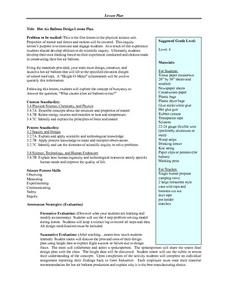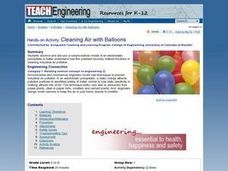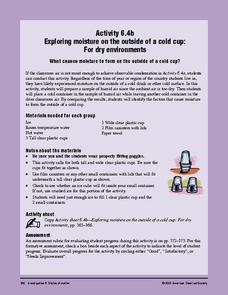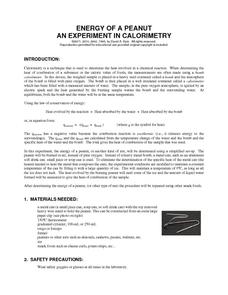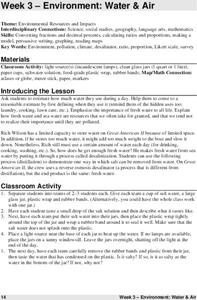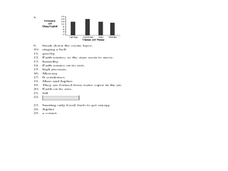NASA
The Big Climate Change Experiment Lesson 4: Weather Versus Climate
Decide whether to learn about weather. An illuminating lesson has scholars first watch video clips and discuss the difference between weather and climate. Using their newfound knowledge, they create analogies to illustrate this...
Curated OER
Sucking Students into an Understanding of Air Pressure and Vacuums
Students develop and test their ideas about air pressure and vacuums by conducting several investigations into the movement of fluids in tubes.
Curated OER
Hot Air Balloon Design Lesson Plan
Sixth graders discuss what they know and what they want to know about hot air balloon using a KWL chart. They then use a wide array of materials to design a hot air balloon that will lift successfully in cooperative groups referring to...
Curated OER
What's Air Got to Do with It?
Young scholars use M&M's to create a pie graph that expresses their understanding of the composition of air. They watch and conduct several simple experiments to develop an understanding of the properties of air (it has mass, it...
Curated OER
Air Pressure
Students perform experiments that demonstrate the characteristics of air pressure. In this physics lesson, students participate and observe experiments using simple household items. The results of these experiments are used to help the...
Curated OER
Cleaning Air with Balloons
Young scholars examine how a pollutant recovery method functions in cleaning industrial air pollution. They listen to a teacher-led discussion, conduct an experiment with balloons, static electricity, and pepper, and observe and record...
Curated OER
Understanding Air Pressure
Fifth graders complete experiments with air to understand that air takes up space, has mass, and that air pressure can be changed. In this air pressure lesson, 5th graders test the air pressure by using balloons, syringes, and water to...
Curated OER
Pollution in the Air and the Water Pollution Solution
Students explore air pollution. In this ecology and air pollution instructional activity, students perform an experiment in which a Vaseline coated lid is placed inside and outside the classroom. Students make predictions and then record...
Curated OER
Turning the Air Upside Down
Students analyze how engineers study temperature inversions and convection currents to understand why pollution levels may be higher in some areas than others. They participate in an experiment that allows them to build simple models to...
Curated OER
Warm Air versus Cold Air
Students discover that warm air takes up more space than cold air. In this science lesson plan, students perform 4 experiments using balloons to determine that the molecules of warm air are more spread out than those of cold air.
Curated OER
Where, Oh Where is All the Clean Air?
Middle schoolers examine the history of air pollution dating back to the Roman Empire. In groups, they research the different types of pollutants in the air and how they can affect the environment. They participate in various...
Curated OER
There's Air in There!
Students attempt to blow a wad of paper into a soda bottle. For this physics lesson, students discover that air pressure inside of a soda bottle prevents new air from going in.
Curated OER
Hot Air Balloons
Students examine how a hot air balloon works. In this hot air balloon lesson, students do an experiment to test the effects of heat on density. Students make their own hot air balloon and act out how nitrogen moves when turned to a liquid.
American Chemical Society
Exploring Moisture on the Outside of a Cold Cup: For Dry Environments
If the area you live in is arid, or the preceding experiment in this unit didn't yield obvious results, use this one in place of it to help reveal where condensation comes from. The mini unit that this is part of a comprehensive...
American Chemical Society
Changing State: Condensation
When you have a cold drink and you notice the water forming on the outside, it is literally pulling the water from the surrounding air to form the condensation. After watching a demonstration of condensation forming on a glass,...
Kenan Fellows
Sensors in Chemistry
The Environmental Protection Agency monitors sensors to track air pollution and set clean air standards. Enthusiastic young scientists use similar sensors to gather data in their area and then apply the gas laws and conservation of...
Captain Planet Foundation
Square Foot Fall Garden
First graders learn the basic needs of plants and identify geometric shapes while planting a fall garden. Combining math and science in one lesson, the resource guides kids through starting their class garden as they discover the...
Cornell University
Buoyancy
Swimmers know to float by turning their bodies horizontally rather than vertically, but why does that make a difference? In an interesting lesson, scholars explore buoyancy and the properties of air and water. They test cups to see which...
Chymist
Energy of a Peanut
Are you nuts? An engaging experiment burns nuts to find their kilocalories. Young chemists analyze at least two different types of nuts with their experimental results versus what is on the package. The resource offers a great lab for...
Science Matters
Thermal Energy Flow in Materials
The sun sends the earth 35,000 times the amount of energy required by all of us on the entire planet, every day. The fourth lesson in the 10-part series looks at how light energy from the sun transfers into thermal energy. Scholars build...
Curated OER
Oxygen vs. Air Pressure
Students perform an experiment to show that water level is affected by air pressure.
Curated OER
Environment: Water & Air
The introduction to the lesson mentions a sailor's limited capacity to store drinking water on his ship. Pupils then set up an overnight experiment to remove freshwater from salt water by distillation. There is a math and map activity to...
Curated OER
Fourth Grade Science Concepts Practice
In this grade 4 science worksheet, 4th graders complete 25 multiple choice questions covering a variety of 4th grade science concepts. An answer key is included.
Center for Innovation
Air Pollution: What is the Solution?
For this air pollution worksheet, students use an online simulation called "Smog City" to manipulate different conditions that affect air pollution. Students answer questions about the health effects at peak ozone levels for different...




